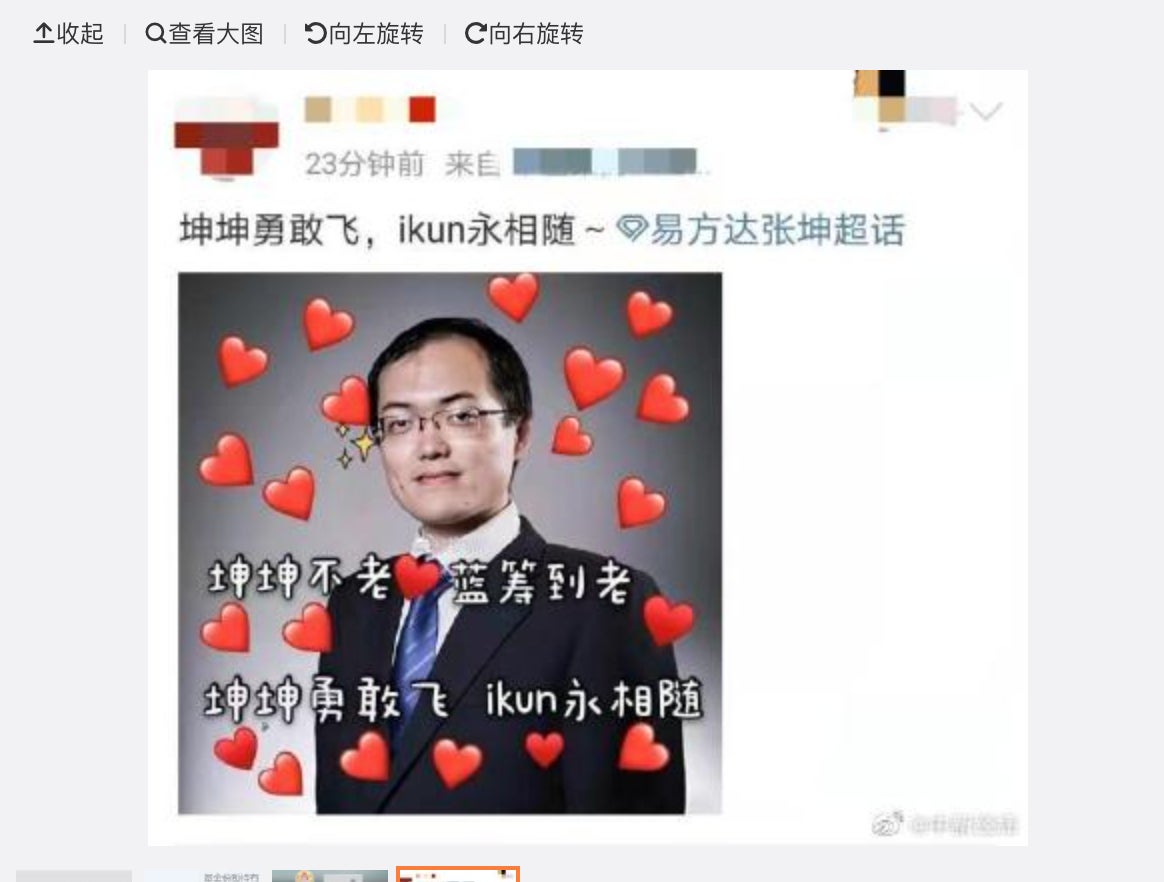China’s Gen Z investors are turning fund managers into social media stars
On a fan community page on Chinese social media platform Weibo, hundreds of users have posted comments and pictures, some covered in little red hearts, to express their admiration for a star they affectionately call Kun Kun.


On a fan community page on Chinese social media platform Weibo, hundreds of users have posted comments and pictures, some covered in little red hearts, to express their admiration for a star they affectionately call Kun Kun.
“Kun Kun flies bravely, iKun will always follow him; Kun Kun never gets old, and will remain a blue-chip till the end,” some users wrote alongside the picture.
“Kun Kun,” whose full name is Zhang Kun, is neither a pop star nor actor. Instead, he is one of China’s most prominent fund managers who oversees around 120 billion yuan ($18.6 billion) in assets at E Fund Management, an established Chinese asset management firm. Zhang’s followers, who label themselves “iKun,” (“i” is a homophone for the Chinese word love), have also created accounts on Weibo posing as his “global fan clubs.”
“Kun Kun, I would like to accompany you for many, many years,” a follower wrote. “Let’s witness both the bull and bear markets, but still return with young hearts.”

Welcome to the gamification of China’s booming mutual fund market.
As the country’s millennial and Gen Z generations come of age as investors, they’re bringing online fan culture to the usually rather staid world of investment. Just as superfans obsess over pop idols or initiate campaigns to propel beloved stars to even greater heights of fame, top fund managers like Zhang are being worshipped like celebrities. To be sure, fund fans’ admiration is mostly a joking way to express happiness over their returns. But the surging online activity around managers and their products is a reflection of the generation’s burning desire to invest—the oldest Gen Z members are in their early 20s and in their first jobs—and its potential to be a strong force in the country’s capital markets.
Young investors have also built fan pages for other star managers like Cai Haosong from Lion Fund Management and Ge Lan from Zhong Ou Asset Management, while one fund-focused news outlet is carrying out a poll asking users to select one of six male fund managers to be their “Prince Charming.” (Spoiler alert: Zhang and a colleague got the most votes.) The interest in the managers reached such a level that some funds have even received and rejected invitations from a popular Chinese entertainment show to interview their star managers, according to financial news outlet National Business Daily.
This landscape poses a fresh challenge for many foreign asset managers, including giants like BlackRock and Vanguard, who have been looking to expand in China since restrictions on foreign ownership of fund management companies were scrapped earlier last year, and who have little experience of China’s meme-driven online fan culture.
“Foreign groups coming in [China] are not adapting, or not at the level or extent that they need to be competitive. [They need to] look at what Chinese competitors do, and copy it,” said Peter Alexander, founder of Z-Ben, a Shanghai-based asset management consultancy.
Young investors
Overall, China’s mutual fund assets jumped from $2.3 trillion in 2019 to $3 trillion last year, the biggest increase in five years, according to China’s Asset Management Association, and the industry’s profits grew by 70% to a record $309 billion last year compared to 2019. One major reason for the strong demand for funds is due to the bullish performance of China’s stock markets which were buoyed by bored citizens who became day traders last year.
But the size of China’s fund market still lags far behind the around $22 trillion held by funds in the US, the world’s largest mutual fund market. This is because China’s fund industry has a much shorter history than that in the US, which launched its first fund in 1924 while it wasn’t until 1998 (link in Chinese) for China to see its first mutual fund firms. Swiss bank UBS has predicted that the country could see this market grow to $16 trillion by 2030.
It’s likely that a large portion of the recent increase in Chinese mutual funds’ assets can be attributed to younger investors—people born since 1980 make up about 40% of the population. More than half of the 20 million new fund investors as of August last year in China were under the age of 30, according to a report (link in Chinese) by Shanghai-based Mob Tech, a research firm. In general, these investors prefer funds to stocks and properties, according to a report (link in Chinese) released in January on the behavior of Chinese stock investors by Tencent Securities, a financial news portal under the namesake tech giant.
“We do see a growing interest among young users in fund investment on Alipay. In 2020, over 50% of new fund investors on our platform were born after 1990,” Liang Jingrui, vice general manager in charge of fund partnership at Ant Group, which owns China’s dominant mobile payment app Alipay that brokers financial products, told Quartz. On average, China’s Gen Z start investing two years after they start working, compared to 10 years for their parents’ generation, according to a 2019 report (link in Chinese) by Alipay and China Institute of New Economy, and Liang said over 60% of the young investors held their position in the funds for more than one year in 2020.
One of the reasons for youngsters to choose funds is because it is a “cheaper way” to have exposure to stocks, especially expensive ones, according to Alexander of Z-Ben.
“Rather than spending hundreds if not thousands of yuan to buy stocks like [alcohol maker]Kweichow Moutai, you can buy funds [that have invested in the company] with one yuan,” he told Quartz. Moutai, the most valuable stock listed in mainland China, has a stock price that’s around now $331, and is a key component of the portfolios of several mutual funds, including two managed by Zhang.
And because of the mobile payments revolution, it’s pretty simple for people to put money into funds, wrote Chinese financial blogger Song Jianwei. Unlike their parents who could only purchase funds through banks, anyone can now do so with a few clicks on online platforms, which also provide information on different products and offer transaction fees that are lower than banks, Song wrote.
Alipay, especially, has become an essential platform for younger adults to manage their finances.
“In previous years I mostly deposited my money with banks while just spending the rest of it. But around three years ago, I started noticing that there are so many investment options on Alipay, which has lowered the threshold for investing,”said Beijing-based Echo Kou. For many people like Kou, Alipay’s money market fund Yu’e Bao, which allows individuals to put in as little as $0.15 is the beginning of their investment journey. Yu’e Bao now has over 600 million users, compared to over 1 billion for Alipay in China.
For 29-year-old Charlene Cong, funds offer a way to diversify from her other investments. “I am a believer in professional investment management, and I trust the ability of active fund managers, who can generate excess return in a market rally and mitigate risks in a market downturn,” she said. Cong has allocated 40% of her money on funds, 30% in insurance, and the rest in stocks.
The fandom investors display toward asset managers, naturally, is a reflection of their fund performance—one of Zhang’s funds delivered nearly 700% returns over eight years. Although Zhang has maintained a low profile despite the interest in him, some managers and their companies have responded to the interest by using social media to engage with new investors. For example, many have started introducing new funds in online live streams that give viewers access to purchase the products directly from their phones.
Fresh leek?
Even during China’s most important family holiday this year—Lunar New Year eve, when families get together for a big meal—over 600,000 people (link in Chinese) watched finance-related live streams on Alipay. The frenzy around investing has even extended to non-finance platforms like video streaming website Bilibili, where some make-up vloggers have begun making videos talking about their investment experiences.
“I bought my first fund recently because it was so trending that I could even see people talk about it on lifestyle apps,” said Xiao Wei Huhu, a blogger and university student in a vlog.
Several commenters praised her for taking charge of her personal finances at a young age. But some worry whether this the investing social media space, and the obsession with finance influencers and star managers, could lead to irrational herd investment decisions.
Ran Cai Jing, a Chinese financial media outlet, compared Gen Z investors to “leeks waiting to be harvested” by finance bloggers, some of whom charge fund investors for joining fan groups they run. Since leeks grow quickly and can be harvested repeatedly, it’s become slang used to reference investors without sufficient financial knowledge who can easily be drawn into speculative trading.
“If youngsters don’t study the companies, industries, and products and only chase returns or short-term trends, then funds could also disappoint them one day,” the outlet wrote in a recent article about the frenzy in mutual funds.